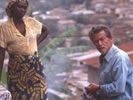Eye For Film >> Movies >> Shooting Dogs (2005) Film Review
How long do you have to wait before mass murder becomes a palatable subject for a movie?
Ten years minimum, it would seem. Hotel Rwanda led the way, bringing to Western audiences a reminder of the genocide that took place in 1994. Now there's Shooting Dogs, which also brings us back to those terrible events. Comparisons are perhaps inevitable and not without foundation.

In portraying the monolithic slaughter of a million Tutsis by Hutu extremists, Shooting Dogs also focuses on some smaller scale true events that encapsulate the horror of what took place - the only way beyond statistics to effectively film such bloodshed. What occurred is realised with sincere, unpresumptuous performances and admirably restrained direction. As the violence starts it is not overtly graphic and, therefore, all the more compelling, which makes for a simple, yet compellingly told, film that deserves to be seen.
When the extremists' mission of extermination began some 2,500 Tutsis and moderate Hutus fled to the Ecole Technique Officielle. It was a high school, run by Christian priests, that also acted as base camp for a company of Belgian United Nations para-commandos. As murder raged across the countryside and through the towns, the Tutsi refugees huddled with the school staff as a seething Hutu ring encircled their compound. The soldiers only watched, their mandate to monitor the "peace" accord, not enforce it. Then they were ordered to abandon the school, robbing the refugees of any semblance of protection.
Rwandans have huge, unsealed scars from this time. They do not need reminding of what happened. The West does and director Michael Caton-Jones uses the character of Joe Connor to draw us in. Played with steadfast conviction by Hugh Darcy, Joe is an easily identifiable young, white, middle-class Western male. A typical gap-yearer, he's teaching at the school with naively altruistic intentions that really satisfy his own glib ideals of self worth. As he says, he's living his own Oxfam dream. When the exterminations begin, he has to catch up to the horrific reality of events and his ineffectual place within them. The point is clear, as Joe the Westerner becomes undone by his inability to change anything, why did the UN troops, who were right there, do nothing, apart from leave?
Rwandan spirit, innocence and vulnerability are best portrayed through Claire-Hope Ashitey's incredibly mature and nuanced performance as Marie, a student and favourite of Joe's, to whom he swears protection. Despite a sense of grim inevitability hanging over her, she brings conviction and depth to a role that could easily have been two-dimensional.
Standing out above all is John Hurt. As head of the school, his Father Christopher is an impassioned old priest, who has a rock solid faith and belief in his humble place in the world. Naturally, the atrocities that transpire are enough to cause such faith to waver in anyone and Hurt handles this with craggy, consummate skill. His character straddles the tangible divide between Joe and Marie and to Caton-Jones's credit he never seeks to provide glib solutions, or heroic explanations.
Perhaps we don't need the years to come to terms with the magnitude of what happened, but rather to diminish this sense of failed responsibility.
Reviewed on: 18 Mar 2006



















